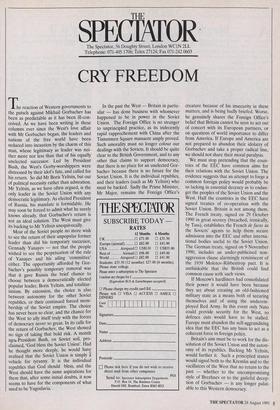SPECTAT THE OR
The Spectator, 56 Doughty Street, London WC1N 2LL Telephone: 071-405 1706; Telex 27124; Fax 071-242 0603
CRY FREEDOM
The reaction of Western governments to the putsch against Mikhail Gorbachev has been as predictable as it has been ill-con- ceived. As we have been writing in these columns ever since the West's love affair with Mr Gorbachev began, the leaders and nations of the free world have been seduced into incaution by the charm of this man, whose legitimacy as leader was nei- ther more nor less than that of his equally unelected successor. Led by President Bush, the West's Gorby-worshippers were distressed by their idol's fate, and called for his return. So did Mr Boris Yeltsin, but out of political necessity rather than admration. Mr Yeltsin, as we have often argued, is the only leader in the Soviet Union with any democratic legitimacy. As elected President of Russia, his mandate is formidable. He may soon be forced to admit what he surely knows already, that Gorbachev's return is not an ideal solution. The West must give its backing to Mr Yeltsin unequivocally. Most of the Soviet people no more wish to see the return of their unpopular former leader than did his temporary successor, Gennady Yanayev — not that the people wished to see the perpetuation of the rule of Yanayev and his ailing 'committee' either. The opportunity afforded by Gor- bachev's possibly temporary removal was that it gave Russia the brief chance to choose between a democratically elected popular leader, Boris Yeltsin, and totalitar- ianism. By extension, the choice is also between autonomy for the other Soviet republics, or their continued forced mem- bership of the Soviet empire. The choice has never been so clear, and the chance for the West to ally itself truly with the forces of democracy never so great. In its calls for the return of Gorbachev, the West showed no sign of taking that bold risk. A month ago.-President Bush, on Soviet soil, pro- claimed, 'God bless the Soviet Union'. Had he thought more deeply, he would have realised that the Soviet Union is simply a vehicle for tyranny. It is the individual republics that God should bless, and the West should have the same aspirations for them that, after some initial doubts, it now seems to have for the components of what used to be Yugoslavia.
In the past the West — Britain in partic- ular — has done business with whomever happened to be in power in the Soviet Union. The Foreign Office is no stranger to unprincipled practice, as its indecently rapid rapprochement with China after the Tiananmen Square massacre amply proved. Such amorality must no longer colour our dealings with the Soviets. It should be quite clear to the British Government, and to any other that claims to support democracy, that there is no place for an unelected Gor- bachev because there is no future for the Soviet Union. It is the individual republics, and their leaders (such as Mr Yeltsin) who must be backed. Sadly the Prime Minister, Mr Major, remains the Foreign Office's creature because of his insecurity in these matters, and is being badly briefed. Worse, he genuinely shares the Foreign Office's belief that Britain cannot be seen to act out of concert with its European partners, or on questions of world importance to differ from America. If Europe and America are not prepared to abandon their idolatry of Gorbachev and take a proper radical line, we should not share their moral paralysis.
We must stop pretending that the coun- tries of the EEC have common aims for their relations with the Soviet Union. The evidence suggests that an attempt to forge a common foreign policy would probably be so lacking in essential decency as to endan- ger the peoples of the Soviet Union and the West. Half the countries in the EEC have signed treaties of co-operation with the Soviet Union. Britain is not among them. The French treaty, signed on 29 October 1990 in great secrecy (breached, ironically, by Tass), establishes the French de facto as the Soviets' agents to help them secure admission into the EEC and other interna- tional bodies useful to the Soviet Union. The German treaty, signed on 9 November 1990, includes an under-publicised non- aggression clause alarmingly reminiscent of the 1939 Molotov-Ribbentrop pact. It is unthinkable that the British could find common cause with 'such views.
If Moscow's hardliners had consolidated their power it would have been because they set about creating an old-fashioned military state as a means both of securing themselves and of using the underem- ployed Red Army. In this event only Nato could provide security for the West, so defence cuts would have to be stalled. Europe must abandon the self-aggrandising idea that the EEC has any basis to act as a coherent force in foreign policy.
Britain's aim must be to work for the dis- solution of the Soviet Union and the auton- omy of its republics. Backing Mr Yeltsin, would further it. Such a principled stance would signal both to the Kremlin and to the vacillators of the West that no return to the past — whether to the uncompromising style of Brezhnev or to the guileful decep- tion of Gorbachev — is any longer palat- able to this Western democracy.


















































 Previous page
Previous page